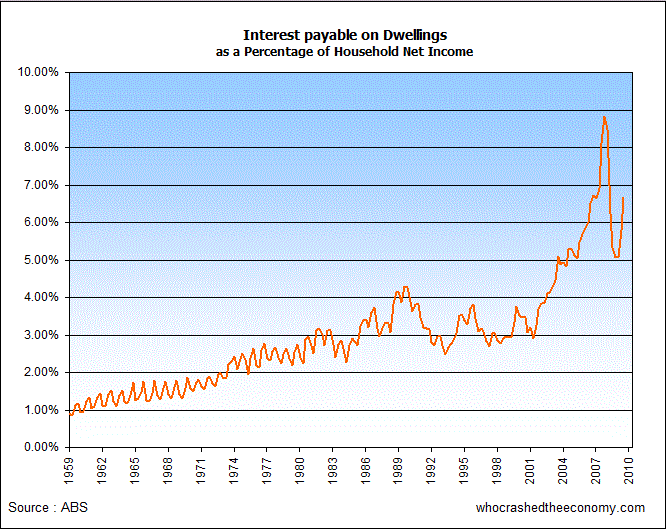The government has often boasted how Australia has dodged the worst of the global financial crisis, but a study released today shows the length some Australian’s have gone to stay afloat.
Despite National Accounts showing the aggregate of all households in Australia are spending 6.6% of their disposable income on dwelling repayments, over 50% more than when Interest rates peaked at 17% in 1989, Australian’s are shameful of losing the family home. Shame has prevented many from contributing to the survey.

The study conducted by the University of Western Sydney and supported by the Reserve Bank of Australia interviewed people suffering mortgage stress. It found “people are literally eating the bare minimum – just rice – obviously looking after their children, but putting the repayment of the mortgage above every other thing that they could possibly devote an expenditure to” according to Professor Phillip O’Neill from the University of Western Sydney. He points out this is not just in the past tense – it is still happening.
The ABC reports he goes on to say the Federal Government should be careful about overstating how easily Australia got through the crisis when so many people are still struggling.
“But he says the drastic moves my some homeowners has helped prevent the kind of mass mortgage defaults seen in the United States, during the global financial crisis.”
“If we did have large-scale defaulting in a neighbourhood in Australia, we would have a toxic affect spreading of negative equity and that would be alarming,”
With so little money being spent in the local economy, business and retailers are bearing the brunt of the cut back in spending. This is likely to result in jobs loses as the crisis continues to deepen, only exacerbating the problem.
» Homeowners ‘living on rice’ to pay mortgage – The ABC, 30th June 2010.

‘It found
The study was conducted by the University of Western Sydney.
This is the same university that Steve Keen, the professor who has been predicting a fall in the Australian housing market for several years now.
I question who benefits from high house prices. The biggest beneficiary of high house prices are the banks who suck more and more money out of household pockets through higher mortgage repayments.
What happens when interest rates go up again?
They won’t even be able to even afford rice…
It is a shame that it has come down to this.
With interest rates going up, bills for water, gas and electricity going up, people have less disposable cash to live on. This has a knock on affect as the less money people have the less money they will inject back into the economy.
Companies profits will be hit due to low sales and they will cut costs and reduce their number of employees or reduce their pay, leaving people with even less money or redundancy.
The banks and estate agents are the ones that push everyone into this situation and there is no regulation of Auctions.
A few more intrerest rate increases by the RBA will push everything to the limit.
I’m somewhat critical of the previous three posts here, as it appears that blaming the banks or anything else for that matter is a good way of palming off the foolishness for big mortgages that in reality rest squarely with those who were blind enough to let their emotions get in the way of common sense. Real estate bubbles are the result of people who fail to use common sense when making important financial decisions, that’s why Australia is in the mess it is in with respect to out of control housing costs….. because the financial facts of life seem to go out the window when it comes to buying a house, no body is driven against their will to overpay for property, they do it of their own emotional desire.
Until people take fiscal responsibility for themselves it will be difficult for real estate to ever return to normal levels. After all, how often do you hear the term “Australian’s love affair with property” – this catch cry boldly states that it is all emotional, after all emotions can run wild, just like house prices.
The countries which were most affected by the GFC either had large manufacturing industries or big financial institutions. Australia has neither of these so it is no surprise that the GFC was not so severe in this country.
Romsey,While individuals have to take some responsibility this thing was has been pushed and fueled by the government and banks. The fallout of this when it comes down will make the US look like a walk in the park.